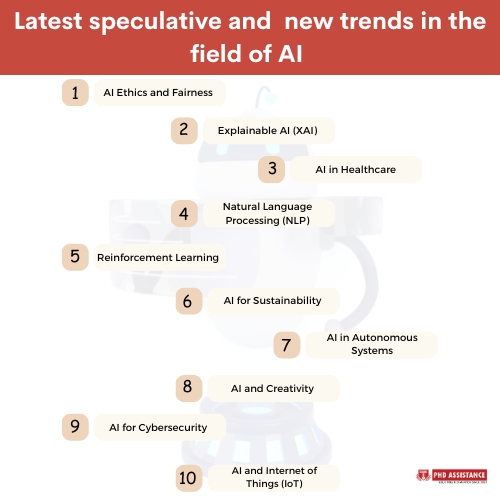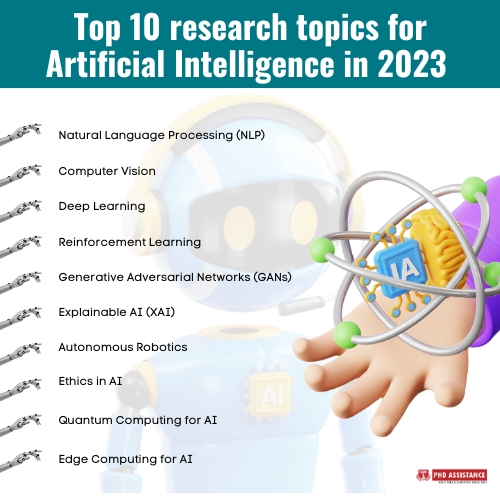Recent PhD Topics in Artificial Intelligence 2023
Artificial intelligence (AI) is expanding rapidly, and its applications are becoming more common in various sectors. As a result, researchers are always looking for new methods to improve AI algorithms and implementations. With the emergence of new technology and approaches, academics are researching novel artificial intelligence study subjects to progress the discipline even further.
This blog will look at the latest PhD research topics in artificial intelligence for 2023. These subjects include a combination of practical and theoretical challenges that might help influence the future of artificial intelligence. Let’s delve into AI research, from natural language processing to autonomous robots.

Introduction
What is PhD topic in Artificial Intelligence?
A PhD topic in Artificial Intelligence involves advanced research and exploration within the realm of AI. It encompasses a wide array of subjects, such as machine learning, natural language processing, computer vision, robotics, and neural networks selection of project topic introduction. Doctoral candidates delve into cutting-edge techniques, developing innovative algorithms and seeking novel applications to address complex challenges. These topics push the boundaries of AI, contributing to its growth and impact on various industries. From enhancing decision-making processes to enabling autonomous systems and tackling ethical considerations, AI PhD Topic selection paves the way for groundbreaking advancements shaping technology and society’s future.
However, some potential areas might be of interest and relevance in the field of AI in 2023. Keep in mind that these are speculative and that new trends may have emerged since my last update:
- AI Ethics and Fairness: With the increasing integration of AI in various domains, there’s a growing concern about ethical issues, bias, and fairness. Dissertation topics in English literature might focus on developing AI models that are more transparent, accountable, and unbiased.
- Explainable AI (XAI): Explainability remains a crucial challenge in AI. Research in this area could explore methods and techniques to make AI models more interpretable and provide understandable explanations for their decisions.
- AI in Healthcare: AI has great potential to revolutionize healthcare. Research might delve into areas like medical image analysis, personalized treatment plans, drug discovery, and AI-assisted diagnostics.
- Natural Language Processing (NLP): NLP continues to be a significant area of research. The focus could be improving language understanding, machine translation, sentiment analysis, and dialogue systems.
- Reinforcement Learning: Advancements in reinforcement learning have shown promise in various fields, such as robotics and gaming. Dissertation topics could explore more efficient algorithms and real-world applications.
- AI for Sustainability: AI can be critical in addressing environmental and sustainability challenges. PhD research might use interesting artificial intelligence (AI) topics to optimize resource management, climate modelling, and sustainability-driven decision-making.
- AI in Autonomous Systems: The development of autonomous vehicles and drones has accelerated, and research could focus on enhancing their safety, decision-making capabilities, and robustness.
- AI and Creativity: Exploring AI’s potential in creative domains like art, music, and storytelling could be a fascinating area of research.
- AI for Cybersecurity: As cyber threats evolve, AI can be leveraged to detect and mitigate attacks. Research might concentrate on building more robust and adaptive cybersecurity systems.
- AI and Internet of Things (IoT): The integration of AI with IoT devices is becoming more prevalent. PhD research design might look into AI-enabled IoT applications, security concerns, and optimizing IoT systems using AI.
Remember that these are just general topics, and PhD research requires a more specific and well-defined research question within the chosen domain. To get the most recent and relevant information, I recommend checking the latest academic journals, conference proceedings, and university websites for updates on AI research topics in 2023.
- Check out our Sample Topic selection for the Project to see how the PhD topic selection is constructed.
Top 10 research topics for artificial intelligence in 2023
- Natural Language Processing (NLP)
- Computer Vision
- Deep Learning
- Reinforcement Learning
- Generative Adversarial Networks (GANs)
- Explainable AI (XAI)
- Autonomous Robotics
- Ethics in AI
- Quantum Computing for AI
- Edge Computing for AI
- Check out our study guide to learn more about PhD Topic selection. How do you choose a topic for your PhD research?

Important Points:
- Natural language processing (NLP) studies how computers perceive and interpret human language.
- Computer vision is the process of teaching machines how to recognize and understand pictures and movies.
- Deep learning is a subset of machine learning in which artificial neural networks are trained using massive volumes of data.
- Reinforcement learning is a sort of machine learning in which an agent is trained to make decisions based on incentives and penalties.
- GANs are a neural network that uses existing data to create new data.
- XAI aims to make AI more transparent and understandable to humans.
- Autonomous robotics is the development of robots that can function autonomously without human intervention.
- AI ethics is concerned with the proper development and application of AI technology.
- Quantum computing is an emerging field.
Conclusion
The 2023 PhD topics in Artificial Intelligence highlight the dynamic field’s growth and promise for revolutionizing industries and improving quality of life. The research emphasizes ethical AI, addressing bias, fairness, and transparency. Advancements in natural language processing make AI more accessible and intuitive. AI-driven approaches revolutionize decision-making, data analysis, and predictive modelling in healthcare, finance, and environmental sciences. Novel AI architectures, such as quantum-based and neuro-symbolic systems, demonstrate efficient algorithms and power.
Integrating AI in robotics and autonomous systems redefines machine interaction, with implications for automation, manufacturing, and transportation. Collaboration between academia, industry, and policymakers is crucial for responsible and ethical ai research topics for beginners in technology development.
About PhD Assistance
PhD Assistance, writers and researchers have extensive expertise in selecting the best topic and title for a PhD dissertation based on their specialization and personal interests. Furthermore, our specialists are drawn from international and top-ranked colleges in nations such as the United States, the United Kingdom, and India. Our authors have the expertise and understanding to choose a PhD research subject that is appropriate for your study and a catchy title that surely fits your research aim.
References
- Holmes, Wayne, Maya Bialik, and Charles Fadel. “Artificial intelligence in education.” Globethics Publications, 2023. 621-653. Doi: 58863/20.500.12424/4273108
- Bermejo, Belen, and Carlos Juiz. “Improving cloud/edge sustainability through artificial intelligence: A systematic review.” Journal of Parallel and Distributed Computing(2023). Doi: 1016/j.jpdc.2023.02.006
- Cerchia, Carmen, and Antonio Lavecchia. “New avenues in artificial-intelligence-assisted drug discovery.” Drug Discovery Today(2023): 103516. Doi: 1016/j.drudis.2023.103516
 Previous Post
Previous Post Next Post
Next Post
